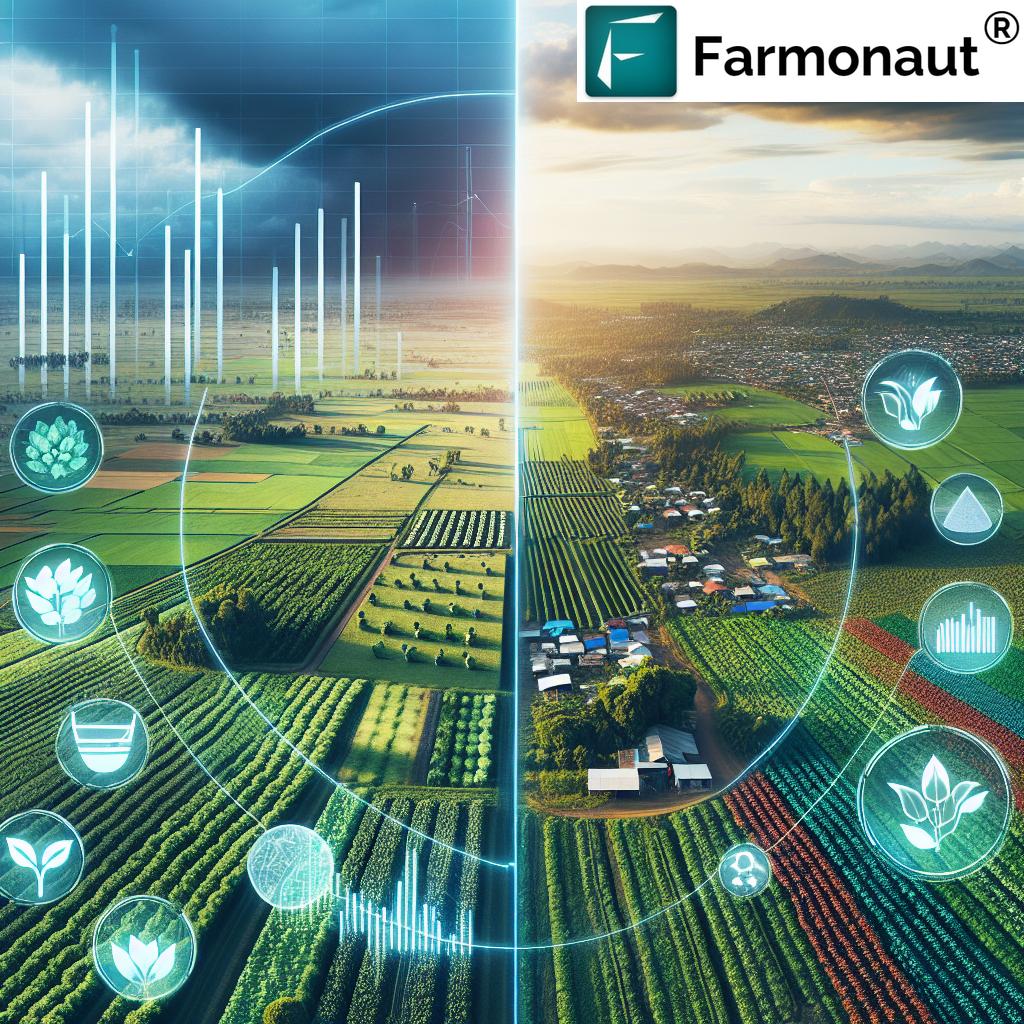Table of Contents
- Introduction: The Next-Gen of Agribusiness Professionals
- Trivia: Youth and Agribusiness Startups
- The Role of Young Agribusiness Professionals in a Modernizing India
- Integrated Agribusiness Professionals: A Holistic Approach
- The Indian Society of Agribusiness Professionals (ISAP)
- Forestry Professionals and the Agribusiness Ecosystem
- Profile Comparison Table: Young Indian Agripreneurs Shaping Sustainability
- Trivia: Integrated Agribusiness Growth
- Driving Sustainability and Business Growth: Tools, Technology & Market Linkages
- Training, Empowerment, and the Expanding Talent Pool
- Challenges and Recommendations for 2025 & Beyond
- Farmonaut: Satellite-Powered Agribusiness Innovation
- FAQ: Agribusiness Professionals & Industry Evolution
- Conclusion: Empowering Young Agribusiness Professionals
Agribusiness Professionals: Young Leaders Shaping Sustainability
Empowering Young Agribusiness Professionals: The Future of Integrated Agribusiness in India
“Over 60% of Indian agribusiness startups are led by entrepreneurs under 35, accelerating sustainability innovations across the sector.”
The Role of Young Agribusiness Professionals in a Modernizing India
In 2025, Indian agribusiness professionals remain a vital pillar of the economy, contributing significantly to employment, rural development, and food security. As India strives toward modernizing its agricultural practices, a new generation of young agribusiness professionals is taking center stage. We refer to these active changemakers as YABPs—a dynamic pool of talent who bring innovation, rapid technology adoption, and an unwavering commitment to sustainability by embracing an integrated agribusiness approach.
Young agribusiness professionals (YABPs) are not simply updating traditional paradigms—they are redefining them. From management and entrepreneurship to technology-driven solutions, their expertise spans supply chain, market linkages, value addition, and policy advocacy. By bridging the gap between producers and markets, they enhance value chains, ensuring better price realization for farmers and ultimately reducing consumer costs.
- Accessing digital tools like AI-enabled agricultural monitoring, remote sensing, and robust data analytics
- Driving productivity gains and promoting climate-smart agriculture
- Fostering agri-startups that leverage innovations such as biofertilizers, post-harvest tech, and cold-chain logistics networks
- Building more resilient agribusiness systems by maximizing market access and technology adoption
Why Young Agribusiness Professionals Matter
The central role of young professionals extends beyond simply replacing ageing workforces. These professionals become instrumental in responding to complex challenges facing Indian agriculture:
- Market volatility and rising input costs
- Need for significant improvements in supply chain transparency and cold chain logistics
- Climate variability and environmental stressors
- Demands for increased incomes, enhanced food quality, and global competitiveness
Young agribusiness professionals consistently show a willingness to learn, adapt and implement new practices, which ensures India’s agriculture sector can meet growing food security demands while protecting the planet’s natural resource base. Their approach—integrating digital technology (remote sensing, AI and data analytics), smart market management, and responsible sustainable practices— sets them apart as pivotal agents in India’s agricultural and rural development story.
Integrated Agribusiness Professionals: A Holistic Approach
The rise of integrated agribusiness professionals is changing the landscape of India’s agribusiness sector in profound ways. The concept of integration in agribusiness goes beyond farm-level interventions—it is a holistic approach that encompasses forestry, livestock, fisheries, value addition, agro-processing, and rural finance, all within the agrarian ecosystem.
- Working across these domains enables professionals to diversify farm incomes and build resilience to market and environmental fluctuations
- Integrated interventions promote resource use efficiency, sustainability, and create new employment opportunities
For example, integrated agribusiness professionals working in forestry promote models for sustainable timber and non-timber forest product harvesting. These efforts contribute to biodiversity conservation and improve livelihoods for forest-dependent communities. This level of cross-sector integration is crucial for achieving circular rural economies and for ensuring the long-term balance between ecological sustainability and economic growth.
Key Features of Integrated Agribusiness Professionals
- Advocates and implements systems approach—considering the entire value chain from resource generation to final product delivery
- Employs modern technology—GIS, satellite remote sensing, AI-based analytics for resource optimization
- Facilitates sustainable forestry initiatives and agroforestry systems, supporting climate adaptation
- Promotes cross-sector entrepreneurship involving fisheries, livestock and rural finance to ensure diversified income for rural communities
The Indian Society of Agribusiness Professionals (ISAP): Nurturing a New Generation
The Indian Society of Agribusiness Professionals (ISAP) is at the forefront of nurturing talented young professionals who drive growth and sustainability across India’s agribusiness ecosystem. ISAP’s mission is aligned with the government’s vision of modernizing Indian agriculture and promoting a holistic approach to agricultural development.
- Skill development workshops equipping the young talent pool with essential agribusiness and management competencies
- Incubation support for rural entrepreneurs tackling real-world challenges within Indian agriculture
- Facilitating partnerships among government agencies, industry, academic institutions, and financial bodies to strengthen the agribusiness ecosystem
ISAP plays an instrumental role in preparing agribusiness professionals to be future-ready, helping them meet the complex challenges of agricultural transformation. Training, advocacy and continuous professional support drive results, making knowledge transfer and capacity building highly actionable and impactful.
ISAP’s training programs—and its active involvement in fostering rural entrepreneurship and digital literacy—have ensured that emerging professionals are empowered to address challenges like climate variability, market volatility, and resource constraints, strengthening India’s development trajectory in the agricultural sector.
Access real-time satellite-powered agricultural data and decision-support directly from your phone or browser!
Forestry Professionals and the Expanding Agribusiness Ecosystem
Forestry professionals in India are increasingly vital within integrated agribusiness. Their training in sustainable timber and non-timber forest products, biodiversity enhancement, and climate adaptation makes them essential for strengthening the rural economy and ensuring ecological balance.
- Promoting integrated models combining forestry, agroforestry, and agricultural productivity
- Building resource resilience across large landscapes
- Supporting local communities in accessing diversified and climate-resilient livelihoods
Professionals operating across forestry, livestock, and fisheries domains help diversify agricultural incomes and stabilize livelihoods even during environmental or market fluctuations. As such, the structure of India’s agribusiness economy is becoming more robust and future-proof.
Profile Comparison Table: Young Indian Agripreneurs Shaping Sustainability
| Name | Age | Agribusiness Focus | Key Innovation/Sustainable Practice | Estimated Impact | Region/State |
|---|---|---|---|---|---|
| Ananya Patel | 29 | Organic Farming, Marketplace Linkage | Blockchain traceability for produce, direct-to-consumer digital platforms | 5000+ farmers reached, 15% increase in farm incomes |
Gujarat |
| Rahul Shekhar | 32 | Precision AgriTech | Remote sensing, AI crop health analytics, smart irrigation | 20% reduction in water & fertilizer use Asia-wide recognition |
Karnataka |
| Harshita Dey | 27 | Agroforestry & Soil Health | Regenerative agriculture, carbon farming, soil health monitoring | 1200 acres restored, Increased biodiversity index |
West Bengal |
| Vikas Rathi | 34 | Post-Harvest Tech & Logistics | Smart warehousing, cold-chain logistics, crop loss analytics | 8% reduction in post-harvest losses, Efficiency in market supply chain |
Madhya Pradesh |
| Sonal Joshi | 30 | Livestock & Dairy Integration | Digital livestock management, precision feeding, rural fintech inclusion | 300+ dairy clusters digitized, Greater credit access |
Maharashtra |
This table highlights why the spotlight on “young Indian agripreneurs”, “sustainable agribusiness examples,” and “agribusiness innovation India” is now greater than ever!
“Since 2015, young professionals have contributed to a 30% rise in integrated agri-business models in India.”
Driving Sustainability and Business Growth: Tools, Technology & Market Linkages
A distinguishing characteristic of young agribusiness professionals and integrated agribusiness professionals in India is their commitment to leveraging technology at every stage of the agricultural value chain.
- Precision agriculture: Utilizing sensors, drones, and remote sensing imagery to pinpoint input application and maximize yields while reducing costs.
-
AI and data-driven decision-making: Deploying analytics to guide sowing, irrigation, harvesting, and logistics for optimal productivity.
Explore how AI and drones are transforming Indian farms in 2025: -
Digital marketplaces and blockchain traceability: Platforms that connect farmers directly with buyers and implement auditable, transparent supply chains.
Learn about blockchain-backed product traceability for reducing fraud and enhancing transparency:
Farmonaut Product Traceability -
Cold-chain logistics and smart warehousing: Integrated logistics solutions that ensure quality preservation and reduce post-harvest losses.
Monitor and manage operational fleets for agricultural, mining, and infrastructure logistics with:
Farmonaut Fleet Management Tool
These approaches empower not only large corporate agricultural enterprises but also thousands of MSMEs and smallholders across India’s vast and varied rural landscape.
Promoting Carbon Footprinting, Regenerative Models, and Resource Management
In 2025, there’s a marked increase in the push for environmentally sustainable business models within Indian agriculture. Carbon footprint measurement, regenerative agriculture, and responsible forestry are now core strategies promoted by integrated agribusiness professionals.
-
Carbon Footprinting: With regulatory pressures and market-driven incentives, tracking and reducing carbon emissions is fast becoming a key business differentiator.
For affordable, satellite-based carbon tracking and compliance, visit:
Farmonaut’s Carbon Footprinting Solution - Regenerative agriculture & precision soil health: These methods use AI, remote sensing, and participatory practices to restore soils, boost organic matter, and create resilient farming systems.
-
Large-Scale Farm & Plantation Management: On big farms and forest plantations, satellite monitoring ensures that managers have a ‘live’ view of resource status, enabling swift and sustainable interventions.
Discover integrated operations and management for large-scale farms at:
Farmonaut Large Scale Farm Management Platform
Financial Inclusion and Smart Insurance
Access to finance remains a key challenge for many agripreneurs. Young agribusiness professionals leverage digital tools for collateral-free micro-credit, loan verification via satellite imagery, and smart crop insurance.
For satellite-verified crop loan and insurance processes, check:
Farmonaut Crop Loan and Insurance Services
- Reduced fraud and simplified claim verification help build institutional trust and expand financial inclusion
- Real-time advisories ensure farmers mitigate risks from weather or climate-related losses
This is especially true in regions affected by fluctuating monsoons, shifting seasons, and unpredictable market prices.
Training, Empowerment, and the Expanding Talent Pool
Both Indian Society of Agribusiness Professionals and rural academic institutions are investing in practical, technology-oriented capacity-building. This is critical for empowering the next generation:
- Leadership workshops: Building confidence in navigating market trends, policy frameworks, and risk mitigation.
-
Digital and satellite technology training: Hands-on exposure to agri-data analysis, satellite surveillance, and digital finance.
APIs and data-driven applications for crop health, weather insights, and farm-resource monitoring are also available. See:- Farmonaut Satellite API Access – Seamlessly integrate real-time satellite insights into existing agribusiness and supply chain software.
- API Developer Documentation – For developers and businesses looking to build custom agribusiness solutions atop advanced geospatial data.
- Networking and ecosystem-building: Peer-to-peer support systems with successful young leaders from across India’s rural regions.
By 2025, we expect the pool of high-impact agribusiness professionals to double, further accelerating sustainable growth throughout the Indian economy.
Challenges and Recommendations for 2025 & Beyond
Despite rapid progress led by young agribusiness professionals and integrated agribusiness professionals, various structural and systemic challenges persist across India:
- Access to formal credit and affordable investment capital remains limited in many rural regions
- Infrastructure gaps—such as rural cold chains, processing facilities, and logistics—continue to limit scale and market integration
- Policy support for agripreneurs should be enhanced for land reforms, contract farming, IP protection, and innovation
- Food loss and waste—inefficient storage and distribution results in significant crop spoilage and loss of farmer income
- Gender inclusivity and social equity—empowering more women and marginalized groups will strengthen sector resilience
- Climate disruptions and market shocks—aggravated by global uncertainties—underline the need for adaptive, future-proof systems
To address these head-on, it is vital to:
- Promote collaborative industry frameworks, where young and integrated agribusiness professionals share learnings and influence better sectoral outcomes.
- Leverage technology and digital infrastructure to scale efficient practices beyond pilot regions and into new markets.
- Invest in training, mentorship, and gender-sensitive programs to expand access to opportunity for all aspiring young agripreneurs.
- Implement targeted policy advocacy, drawing on the expertise of ISAP and rural thought-leaders to secure long-term sectoral growth.
If India pursues these strategies, 2025 and beyond can witness truly inclusive, resilient, and high-value rural economies, led by empowered young agribusiness professionals.
Farmonaut: Satellite-Powered Agribusiness Innovation
At Farmonaut, we recognize that data-driven decision support is indispensable for young agribusiness professionals and their integrated teams in India and beyond. Our mission is to make satellite-driven insights affordable and accessible to all, enabling:
- Real-time crop monitoring for optimizing farm health, yields, and resource use
- AI-based advisory for tailored field interventions—empowering agripreneurs to maximize productivity
- Blockchain-based traceability platforms for supply chain authenticity and fraud prevention
- Fleet and resource management for increased logistics efficiency in agriculture and allied sectors
- Carbon footprint tracking and regulatory compliance at both local and global levels
We also support individual farmers, large agribusinesses, and governments in their growth journey. From precision agriculture in Madhya Pradesh, to environmental monitoring in Assam, to financial institutions verifying crop insurance operations across rural India, Farmonaut’s solutions are designed for every scale of operation.
Interested in making your operations smarter and more sustainable? Try our flexible subscription solutions:
Use Farmonaut’s web, Android, or iOS app to access easy, affordable and high-impact satellite analytics anytime, anywhere in India.
FAQ: Agribusiness Professionals & Industry Evolution
What is meant by “young agribusiness professionals” and why are they important in 2025?
Young agribusiness professionals refer to individuals—usually under 35 years—actively leading innovation, sustainability, and enterprise development in India’s evolving agriculture sector. In 2025, they are a dynamic force behind technology adoption, business model innovation, integrated rural development, and the transition to sustainable agricultural practices.
What is the “integrated” approach in Indian agribusiness?
An integrated agribusiness approach connects crop agriculture with livestock, fisheries, forestry, value addition, and rural finance for a resilient and diversified rural economy. Integrated agribusiness professionals bridge multiple domains for better incomes, sustainability, and adaptability.
How does technology drive growth for young professionals?
Technology—such as satellite data, AI, digital tracing, smart logistics, and precision farming—enables young professionals to improve crop yields, reduce losses, streamline supply chains, and drive sustainable, data-driven decision-making.
What role does ISAP play in nurturing agribusiness professionals?
The Indian Society of Agribusiness Professionals (ISAP) focuses on training, leadership development, advocacy support, and incubation for young agripreneurs to build capacity and address rural challenges. ISAP enhances digital literacy, market access, and policy awareness, keeping professionals future-ready.
How can someone access Farmonaut’s services?
Farmonaut’s services are available through a web platform, mobile apps (Android/iOS), and API integration. Users can subscribe online or access more information at their official website.
Conclusion: Empowering Young Agribusiness Professionals in India’s Sustainable Future
The transformation of the Indian agricultural sector increasingly rests on the shoulders of young and integrated agribusiness professionals. Their entrepreneurial spirit, technological savvy, and dedication to sustainability drive rural growth, create new livelihoods, and ensure India’s food security amidst ever-changing global and local realities.
Organizations like the Indian Society of Agribusiness Professionals and modern tech-driven platforms (such as our own at Farmonaut) ensure that the talent pool is nurtured, trained, and empowered to lead change.
As India continues its strides toward modernizing agriculture, empowering these professionals will be pivotal to creating a prosperous, inclusive, and sustainable agricultural economy in 2025 and beyond.
Ready to embrace the future? Explore:
- Farmonaut Carbon Footprinting – Measure and reduce your agri enterprise’s carbon emissions
- Farmonaut Product Traceability – Boost transparency and consumer trust
- Fleet Management Services – Optimize operations beyond the field
- Farmonaut API – Integrate scalable, satellite-based agri-data solutions into your business workflow
India’s young, talented pool has already begun to shape the future—let’s continue empowering them!












